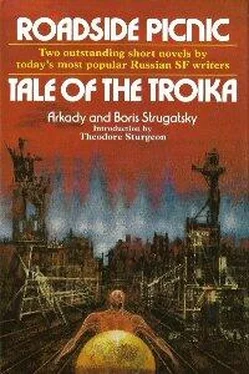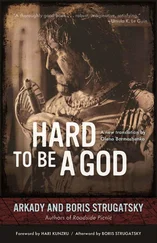“The evening session of the Troika is hereby declared opened,” Lavr Fedotovich said. “Next! Your report, please, Comrade Zubo.” The commandant jumped up, and holding the open folder, began speaking in a high-pitched voice:
“Case 42. Surname: Mashkin. Name: Edelweiss. Patronymic: Zakharovich.”
“When did he suddenly become Mashkin?” Khlebovvodov demanded disdainfully. “Babkin, not Mashkin! Babkin, Edelweiss Za-kharovich. I worked with him way back when in the Committee on Dairy Affairs. Eddie Babkin, a stout fellow, loved heavy cream. And, by the way, he’s no Edelweiss, either. He’s Eduard. Eduard Petrovich Babkin.”
Lavr Fedotovich slowly turned a stony face to him.
“Babkin?” he said. “I don’t remember. Continue, Comrade Zubo.”
“Patronymic: Zakharovich,” the commandant continued, his cheek twitching. “Year and place of birth: 1942. City of Smolensk. Nationality …”
“E-dul-weiss or E-dol-weiss?” asked Farfurkis.
“E-del-weiss,” said the commandant. “Nationality: Belorussian. Education: Incomplete secondary general, incomplete secondary technical. Knowledge of foreign languages: Russian, fluent, Ukrainian and Belorussian, with a dictionary. Place of occupation …”
Khlebovvodov suddenly smacked himself loudly on the forehead.
“Of course not!” he shouted. “He died!”
“Who died?” Lavr Fedotovich asked woodenly.
“That Babkin! I remember as if it happened yesterday—he died of a heart attack in 1956. He had become financial director of the All-Russian Society of Nature Experimenters and he died. So there must be some mistake here.”
Lavr Fedotovich took his opera glasses and studied the commandant, who had lost his faculty of speech.
“Does your report reflect the fact of his death?” he inquired.
“As God is my …” babbled the commandant. “What death? He’s alive, he’s in the waiting room.”
“Just a minute,” Farfurkis interrupted. “Allow me, Lavr Fedotovich? Comrade Zubo, who is waiting in the room outside? But be precise. Surname, name, and patronymic.”
“Babkin!” the commandant said in despair. “No, no, what am I saying? Not Babkin—Mashkin! Mashkin is waiting. Edelweiss Za-kharovich.”
“I understand,” said Farfurkis. “And where is Babkin?”
“Babkin died,” said Khlebovvodov authoritatively. “I can tell you that for sure. In 1956. Of course, he did have a son. Pavel, I think. That means his name was Pavel Eduardovich. He runs a textile remnants store in Golitsyn, which is south of Moscow. He’s a good businessman, but I don’t think his name is Pavel after all.”
Farfurkis poured a glass of water and gave it to the commandant. In the gathering stillness, we could hear the commandant’s resonant gulps. Lavr Fedotovich kneaded a cigarette.
“No one is forgotten and nothing is overlooked. That is good. Comrade Farfurkis, I will ask you to enter into the minutes, in the verification section, that the Troika feels it would be valuable to take measures to find the son of Babkin, Eduard Petrovich, in order to determine his name. The people do not need nameless heroes. We do not have them.”
Farfurkis nodded and began writing rapidly in his notebook.
“Have you had enough water?” Lavr Fedotovich inquired, looking at the commandant through his opera glasses. “Then continue your report.”
“Place of occupation and profession at present time: Retired inventor,” the commandant read unsteadily. “Travel abroad: None. Brief description of the unexplained: A heuristic machine, that is, an electronic and mechanical apparatus that solves engineering, scientific, sociological, and other problems. Nearest relatives: Orphan, no brothers or sisters. Address of permanent residence: Novosibirsk, 23 Shchukinskaia Street, apartment 88. That’s all.”
“Any motions?” asked Lavr Fedotovich, lowering his heavy lids. “I move we let him in,” said Khlebovvodov. “Why do I suggest this? Because what if he is Pavel?”
“Any other motions?” asked Lavr Fedotovich. He felt around the table for the button, could not find it, and addressed the commandant. “Let the case come in, Comrade Zubo.”
The commandant hurled himself at the door, stuck out his head, and immediately returned, backing all the way to his seat. Behind him, bent by the weight of a huge black case, came a wizened little old man in a long belted blouse and military jodhpurs with orange braid. On the way to the table, he tried several times to stop his forward motion and give a dignified bow, but the case’s powerful inertia dragged him ever forward. There might have been casualties if Eddie and I had not grabbed the little old man just inches away from the trembling Farfurkis. I recognized the old man—he had come to the institute many times, and to many other institutes, and once I had seen him in the reception room of the Deputy Minister of Heavy Machine-building, where he was first in line, patient, clean, and brimming with enthusiasm. He was a nice little old man, and harmless, but unfortunately he could think of himself only as an instrument of scientific and technological progress.
I took the heavy case and lugged his invention up on the demonstration table. Freed at last, the old man bowed and said in a quavering voice:
“My respects. Edelweiss Zakharovich Mashkin, inventor.”
“That’s not him,” Khlebovvodov said in a low voice. “That’s not him and it doesn’t even look like him. I guess it’s a completely different Babkin. Just someone with the same name, I guess.”
“Yes, sir,” agreed the little old man, smiling. “I’ve brought this to be judged by the public. Professor Vybegallo, here, God grant him health, recommended it. I’m ready to demonstrate it, if you like, because I sure have been overstaying my welcome in your Colony.”
Lavr Fedotovich, who was scrutinizing him attentively, laid down his opera glasses and cocked his head. The old man bustled around. He took the cover off the case, revealing a bulky, ancient typewriter, took a bundle of wiring from his pocket, stuck one end into the bowels of the machine, unwound the wiring, and plugged it in.
“There, if you please, you have the heuristic machine,” said the old man. “A precise electromechanical apparatus for answering any questions, specifically scientific and economic ones. How does it work? Being short of funds and being held up by various amounts of red tape, I have not been able to make it fully automatic yet. The questions are posed orally, and I type them and enter them inside, bring them to its attention, so to speak. Its answers, again due to incomplete automation, are typed by me again. I’m a type of middleman here, hee hee! So, if it pleases you, let us begin.”
He moved up to the machine and switched it on with a grand gesture. A neon light went on in its bowels.
“Please,” repeated the old man.
“What’s that light in there?” Farfurkis asked curiously.
The old man immediately struck the keys, then quickly tore the paper from the roller, and raced up to Farfurkis. Farfurkis read it aloud.
“Question: What is that … hum … that lo … lofjt. Or is it pofit? What’s this lofjt?”
“That’s ‘light’,” said the old man, giggling and rubbing his hands together. “That’s code.” He grabbed the paper from Farfurkis and ran back to the typewriter. “That was the question,” he explained, putting the paper back in the roller. “And now let’s see what it answers.”
The members of the Troika watched with interest. Professor Vybegallo glowed with fatherly pride and with refined and flowing movements picked litter from his beard. Eddie had settled into an apathetic gloom. Meanwhile the old man typed away. He pulled out the paper again.
Читать дальше












